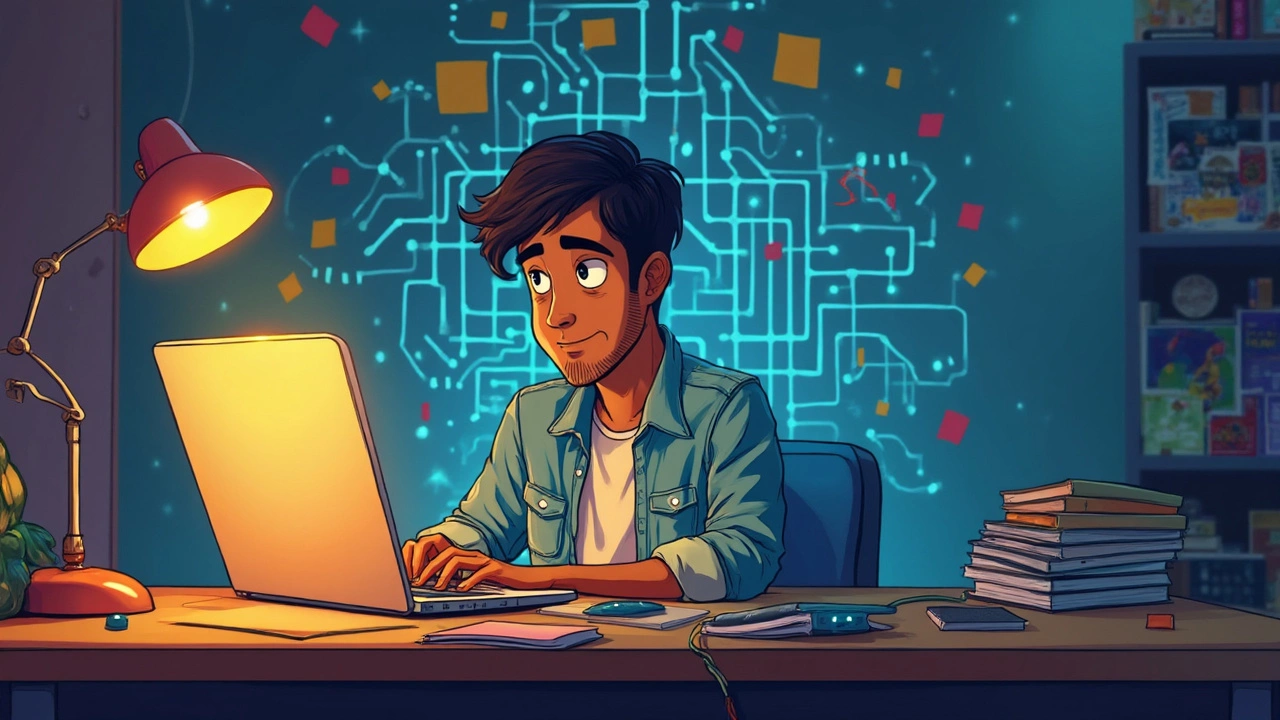So, you're itching to dive into coding, but you're probably wondering, 'How long is this going to take?' Good news! It’s not a lifetime commitment to become proficient. With the right approach and mindset, you can pick it up quicker than you'd think. Let's roll up our sleeves and bust through some of the myths about the time it takes to learn coding.
First things first, start simple. Forget about trying to learn everything all at once—that’s a shortcut to overwhelm city. Instead, choose one programming language, like Python or JavaScript. These languages are known for being beginner-friendly, making them perfect starting points.
Now, if you really want to speed things up, consistency is key. Set up a daily routine, even if it’s just 20-30 minutes. That regular practice will add up over time, making things click way faster than cramming for hours once a week.
- Getting Started with Coding
- Tips for Quick Learning
- Overcoming Common Hurdles
- Measuring Your Progress
Getting Started with Coding
Alright, so you're ready to jump into the world of coding. Here's where many begin: choosing the right language. While there are endless options, starting with a beginner-friendly language like Python or JavaScript can make your life a whole lot easier. Python is known for its clean syntax, making it great for newbies, while JavaScript is perfect if you're interested in web development.
Once you pick a language, set up your environment. For most languages, you'll need an Integrated Development Environment (IDE). Think of an IDE as your coding canvas. Popular ones like Visual Studio Code or PyCharm have tons of features that help catch mistakes before they become headaches.
Now, let's talk resources. The internet is bursting with coding classes and tutorials, many of them free. Websites like Codecademy, Coursera, and FreeCodeCamp offer comprehensive courses that walk you through the basics and beyond. Find one with projects you can work on. Tackling real-world problems is the best way to cement your knowledge.
Here’s a simple plan to get you started:
- Choose your language: Python or JavaScript for ease of learning.
- Set up your IDE: Download and familiarize yourself with tools like Visual Studio Code.
- Pick a course: Explore platforms like Codecademy for structured lessons.
- Start small projects: Build a simple program like a calculator or to-do list.
And remember, it's not a race. Everybody learns at their own speed. The important thing is to enjoy the process and not get discouraged when things get tricky. Learning to code is like solving a puzzle—it takes time but getting that final piece in place is definitely rewarding.
Tips for Quick Learning
Trying to speed up your coding journey? You're in the right place! Here are some practical tips to boost your learning pace and help you become a proficient coder in no time.
First up, leverage online resources. Sites like Codecademy, Coursera, or freeCodeCamp offer structured courses that are perfect for beginners. The step-by-step guidance can unravel even the most confusing concepts. Plus, many of these platforms let you learn at your own pace, which is a bonus when you're juggling other commitments.
Ever heard of pair programming? It’s as it sounds—coding with a buddy. This method is gold because it gives you immediate feedback and different perspectives on problem-solving. Not to mention it can make coding more fun and less of a lonely endeavor.
Next, embrace project-based learning. It's one thing to solve problems in a vacuum, but applying those skills to real projects is where the magic happens. Start with simple projects—a personal website or a basic app. This hands-on experience will reinforce what you’ve learned and make the lessons stick.
- Practice daily: Consistency's the name of the game. Dedicate a small slice of your day to coding, even just 20 minutes, and watch your skills grow like crazy.
- Seek Feedback: Share your code on platforms like GitHub or Reddit. Others can provide tips or highlight areas you haven’t considered.
- Join a community: Coding forums or local meetups are excellent places for getting support and inspiration.
Let's wrap with an eye-opener: did you know The Bureau of Labor Statistics shows jobs in software development are expected to grow 22%, much faster than average? Talk about motivation! Fast-tracking your coding skills can open a door to a promising career path.

Overcoming Common Hurdles
Let's face it, learning to code can feel like hitting a wall sometimes. Don’t panic, though. This is totally normal! Everyone who’s tried to learn coding has run into these tough spots, and the trick is knowing how to tackle them.
A major hurdle is the fear of making mistakes. Here’s the thing: mistakes are your new best friends. The more you mess up, the more you learn. Debugging those pesky errors not only teaches you what not to do, but also helps you understand how things work under the hood. So, don’t shy away from mistakes—embrace them and keep pushing forward.
Another common roadblock is the overwhelming amount of resources available. With so many tutorials, books, and courses, it’s easy to get stuck in the research phase. Instead of dabbling here and there, pick a structured course online. Platforms like Codecademy or freeCodeCamp provide paths that guide you step-by-step. Sticking to one path can prevent information overload and keeps you focused.
Let's talk about the dreaded imposter syndrome. It's that nagging feeling that you’re not good enough or that everyone else knows more than you do. Here’s a little secret: every coder, regardless of their level, feels this way at some point. Remind yourself that every expert was once a beginner. Building projects, no matter how small, helps combat this feeling. Each project completed adds to your confidence and gets you closer to becoming a proficient coder.
Struggling with motivation is also pretty common, especially after those initial bursts of enthusiasm die down. To keep the spark alive, set small, achievable goals. Break your learning into bite-sized pieces and celebrate each win. If one language or project frustrates you, switch it up for something new. This variety can keep things fresh and engaging.
Lastly, don’t underestimate the power of community. Engaging with fellow learners or more seasoned developers online can provide support, answer questions, and even inspire you. Websites like Stack Overflow or Reddit’s /r/learnprogramming are invaluable. They’re not only a place to get help but also where you’ll realize you're not alone in this journey.
Measuring Your Progress
So you’ve started your coding journey and maybe you're wondering, 'Am I actually getting anywhere?' Measuring progress can keep you motivated and show those coding classes are paying off. Let’s break it down into some easy ways to track your development.
First, mark small achievements. Completed your first program without errors? That’s huge! Solving your first algorithm problem? Another win! These little victories boost your confidence and keep you moving forward.
Use online coding challenges to measure skill level. Websites like Codecademy or LeetCode offer structured paths and problems to solve. Track your time and success rate; this gives you a clear picture of where you stand and what areas need improvement.
Consider maintaining a project or portfolio. Having something tangible like a personal website or a GitHub repository of your projects is an excellent way to see how far you've come. Plus, it’s great when you’re ready to show off to potential employers!
Another cool trick is keeping a learning journal. Jot down what you learned each day, problems solved, and even any mistakes made. This not only helps reinforce what you've learned, but also gives you a timeline of progress.
Finally, every few months, take a step back and assess your goals. Maybe you started wanting to learn basic HTML and now you're experimenting with JavaScript frameworks. This reassessment helps you align your learning path with your end-goal, whether it’s becoming a web developer or just getting fluent in programming basics.



